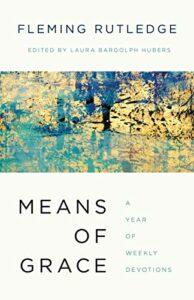 Means of Grace: A Year of Weekly Devotions Fleming Rutledge (Eerdmans) $24.99 OUR SALE PRICE = $19.99
Means of Grace: A Year of Weekly Devotions Fleming Rutledge (Eerdmans) $24.99 OUR SALE PRICE = $19.99
I don’t think I am exaggerating to say that this is surely one of the most anticipated and eagerly awaiting releases of the year. It seems that the broader theologically book buying world is catching up to our steadfast promotion of her work — her first collection of sermons was called The Bible and the New York Times and released in the summer of 1999 and thanks to our faithful sales rep at Eerdmans in that century (Bruce Robinson) we were alerted and duly impressed. We’ve been lugging her books to events ever since and it is delightful to see how particularly those in the evangelical world have taken to her relevant, gospel preaching. As a faithful Episcopalian preacher she has cited Scripture, Barth, her old friend Will Campbell, and all sorts of contemporary books and films as she has brought God’s Word to her urbane New York City parish and to conferences, gatherings and readers all over the world. She is one of the important religious voices of our time.
Rutledge’s great collections of sermons have long inspired many but her break-out book, as they say, seems oddly to have been her most dense (and thick at almost 700 pages!) and very important, The Cruxificition put her on the religious best sellers list. I’ve raved about her singular Advent sermon collections and she has more than one book of Lenten and Good Friday sermons. I have read countless times many of the many sermons in The Undoing of Death and I even highlighted her Advent: The Once and Future Coming of Jesus Christ at Jubilee last year, knowing it may have been a stretch for young evangelical college students. It is fabulous that a year or two ago Eerdmans reissued her Help Thou My Unbelief sermon collection in a handsome hardback edition. Fleming told Beth and me once that her favorite book to do, though, was her 2004 release The Battle for Middle-earth: Tolkien’s Divine Design in “The Lord of the Rings.”
In any case, she is a thoughtful, eloquent author, elegant in a way that might bring to mind Barbara Brown Taylor (another legendary Episcopalian preacher.) Pastor Rutledge is remarkably generative and thoughtful and creative (and blunt) yet remained bounded and stimulated by a historic, beautiful orthodoxy in a way Dr. Taylor perhaps has not. It makes sense that many of Fleming Rutledge’s most admiring fans are thoughtful evangelicals.
As Richard Mouw has written of her book The Crucifixion,
Though I have been thinking much about the cross of Christ for a half-century now, Fleming Rutledge has taught me many new things in this wonderful book. And where she addresses matters that I have long cherished, she has inspired me anew. This book is a gift to all of us who pray for a genuine revival of cruci-centric preaching and cruciform discipleship!
Of the many, many rave endorsements of her tome, I like this from Marilyn McCord Adams, now at Rutgers:
To those who think they want a maximally mellow God who overlooks our faults and accepts us just as we are, Rutledge’s challenge is to ‘get real.’ Twentieth-century atrocities bear witness: there is something drastically wrong with the human condition, which only God can fix. Setting things right calls for crucifixion, not only Christ’s but also ours. Rutledge has given us a very Pauline book, full of information and observations to provoke clergy to preach the cross to their congregations.
And so, we are very happy and even proud to announce that we have a bit early the brand new devotional gleaned from several of her great sermon collections. The title Means of Grace, Rutledge says in a great, new forward, is about the only new thing she contributed. The wonderful Eerdmans employee — in marketing, actually — Laura Bardolph Hubers did the editing, culling and trimming sermons from Eerdmans hefty backlist of Rutledge sermons. And Fleming is very happy with the result of her hard work.
There are a few more than 52 sermons here, the idea that you might read one a week. There are a few extra for Christmas, Good Friday, Easter, etc. They have been trimmed and edited in a way to make them about the same length so they really are ideal for your personal spiritual reading. Importantly, they are arranged in light of the liturgical calendar so is a subtle but helpful introduction to the church year. Kudos!
Ms Hubers lovely introduction about her affection for this material and the author is so nice that I read it all out loud to Beth. We both, then, read Fleming’s fabulously reassuring and grateful testimony that she trusts Eerdmans and Ms Hubers with this demanding project. These two introductory pieces are themselves just fabulous. We do not know — Fleming herself says she does not know — if there will be any more new books from Fleming Rutledge. But for true fans (and for newbies, too) Means of Grace: A Year of Weekly Devotions is a perfect volume. We are happy to announce it, as we have all her others, with a warm and hearty endorsement. It is well made and feels just right in the hand — not too big, but solid. We really encourage you to consider getting a few of these — they would make great gifts for friends or pastors or graduates. are not alone in being thrilled to announce this gem of a resource for those wanting serious and Bible-based devotional reading.
Just for fun, enjoy these fabulous endorsements from the back cover:
“Brilliant. . . . Rutledge is not only a gifted theologian and homilist, but a profoundly gifted wordsmith as well, and her luminous prose gives insight on each page. I will be using this book for my own devotions, and I commend Rutledge’s wisdom to the whole church.” Tish Harrison Warren author of Liturgy of the Ordinary and Prayer in the Night
“Fleming Rutledge is one of the best preachers of our time because of her relentless focus on the boundless grace made available to us in Jesus Christ. With a preacher’s heart, an incisive mind, and a lively theological imagination, she opens that Gospel to us week by week. What a gift.” Alan Jacobs, author of Breaking Bread with the Dead
“I cannot think of a more reliable guide to escort us through the church calendar with weekly devotions than Fleming Rutledge. Her love of holy Scripture and the sacred calendar combined with her half century of preaching expertise make Means of Grace a precious gift.” Brian Zahn, author of Sinners in the Hands of a Loving God
Means of Grace is exquisite. Fleming Rutledge’s offerings here, curated and edited by Laura Bardolph Hubers, plumb the depth of human experience and eye trifle the Christian imagination. They re-enchant us, turn our gaze toward God, and anchor us in the good, the true, and the beautiful.” Marlena Graves, author of The Way Up is Down
Fleming Rutledge picks you up, dusts you down, gives you a good talking to — but in a way that leaves you more alive, more excited to be a Christian, more thrilled with God. Her fearless writing communicates to the reader that if you leave the kid gloves aside, you’ll meet the real God — not the one lazy or complacent sermons have shown you before.” Sam Wells, vicar of St. Martin-in-the-Fields
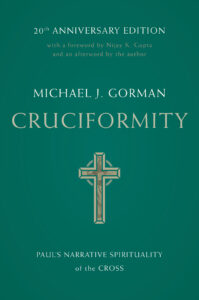 Cruciformity: Paul’s Narrative Spirituality of the Cross: 20th Anniversary Edition Michael J. Gorman (Eerdmans) $40.00 OUR SALE PRICE = $32.00
Cruciformity: Paul’s Narrative Spirituality of the Cross: 20th Anniversary Edition Michael J. Gorman (Eerdmans) $40.00 OUR SALE PRICE = $32.00
I want to celebrate this very new release of an expanded anniversary edition of my friend Michael Gorman’s important book. The cover is boring (so let that go) but the book is surely not. One informed reader recently listed about five or six great recent books that have been directly influenced by Mike and his several books on the cruciformity of Pauline theology. I might suggest that no lesser lights than Fleming Rutledge and N.T. Wright are in that number. (In fact, we once got to sell books at an impressive gathering where Gorman responded critically but graciously to the then brand new Cruxificition and Fleming replied, all hosted by the wonderful folks at St. Mary’s Ecumenical Institute in Baltimore MD.) We are thrilled to see this new edition that includes a notable new foreword by Nijay K, Gupta and a new afterword (27 footnoted pages!) by Dr Gorman himself.
Rumor has it that Mike is working on a serious pastoral commentary on Romans that will be released in 2022. I would suggest that as you await that one, you should read or re-read this contemporary classic.
Michael Gorman is that rare scholar who can write for both the academy and the church. Cruciformity is a gift to both. Gorman offers in readable form a thorough study of how the crucifixion of Jesus remakes Paul’s understanding of God and undergirds his views of what it means to be in Christ. In its exploration of how the apostle experienced God’s love and grace through ‘the strange story of Christ crucified,’ Cruciformity charts a path for how that story might continue to shape daily lives today, in cruciform faith, hope, love, and power.”— Rebekah Eklund author The Beatitudes through the Ages
“Thanks to Michael J. Gorman, ‘cruciform’ has come to describe the architecture of Christian community even more than the architecture of Christian buildings, with the term becoming an essential lens through which we view the apostle Paul’s pastoral theology. Cruciformity is an indispensable resource because Gorman’s careful scholarship and pastoral concern mirror the apostle Paul’s own efforts to illuminate the implications of Jesus’s ignominious public lynching. Bible teachers and students should keep Cruciformity nearby as a handy reference whenever studying Paul’s writings.” — Dennis R. Edwards author Might from the Margins
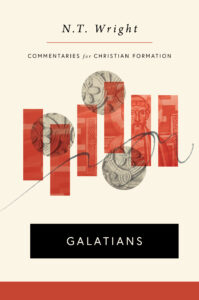 Commentaries for Christian Formation: Galatians N.T. Wright (Eerdmans) $39.99 OUR SALE PRICE = $31.99
Commentaries for Christian Formation: Galatians N.T. Wright (Eerdmans) $39.99 OUR SALE PRICE = $31.99
I can be brief since I am sure that most of our readers know of the importance of the estimable, delightful, important N.T Wright. We have sold books with and for Tom on several occasions and he was generous enough to come to speak at our backyard a few years back as he preached from his fabulous How God Became King which remains one of my favorite books.
This hefty new hardback is one of the first major commentaries Tom has done. (He wrote the useful Tyndale Commentary on Colossians and has written extensively about Galatians in his must-read The Climax of the Covenant: Christ and the Law in Pauline Theology which was published by Fortress in the early 1990s! And he did the wonderfully brief overview of each New Testament book in his For Everyone paperback commentary series. He has written very much on Paul and justification and the Kingdom and so forth; in fact, we have mentioned at BookNotes his significant hardback collection of academic articles called Interpreting Paul: Essays on the Apostle and His Letters. But this — this is a new level of focus with a major volume designed to bring scholarly commentary to the church for the sake of faith formation. (The series is being edited by Stephen Fowl, Jennie Grillo and Robert Wall and there will be more by other authors.)
Just about any new commentary on Galatians by N.T. Wright would be a near publishing event. That this one is written as it is, with a view to help nurture all of God’s people (not just preachers and Bible scholars) makes it a marvelous important and joyful release. We highly recommend it.
As Wright notes,
A biblical commentary is first and foremost a work of history. But history is a matter of learning not only the tune but also the rhythm and the harmonies. As in all historical work, the sympathetic imagination required for the historian to enter into the mind-set of the original author and hearers is in constant dialogue with the sympathetic imagination required to think into one’s own contemporary situation. The Christian formation that may result from such labor is a matter of God’s Spirit going to work in the minds, hearts, teaching, and learning of the whole people of God.
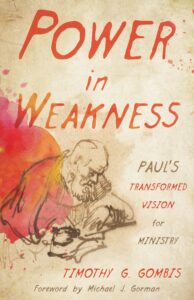 Power in Weakness: Paul’s Transformed Vision for Ministry Timothy G. Gombis (Eerdmans) $25.00 OUR SALE PRICE = $22.40
Power in Weakness: Paul’s Transformed Vision for Ministry Timothy G. Gombis (Eerdmans) $25.00 OUR SALE PRICE = $22.40
I have noted earlier that Mike Gorman has influenced many young Biblical scholars, pastors and Christian activists. Gombis is apparently one of those and what a fine young scholar he is! We are thrilled to know that he is at Grand Rapid Theological Seminary (where he teaches New Testament.( His previous books have included a commentary on Mark in the “Story of God Commentary” series (Zondervan Academic), one on Ephesians (IVP Academic), and Paul: A Guide for the Perplexed (T&T Clark.) To suggest he is an important a rising scholar is an understatement.
This small paperback is very, very important and breaks very significant ground around issues of Paul’s “cruciformity” and his proclamation of the cross. In other words, Paul rejected worldly power-mongering and offers a vision of pastoral work that is about servanthood, vulnerability, weakness, even, “as the key to flourishing community that is able to experience God’s transformation, restoration, and healing.” This book is pointing us to what his might mean for pastors and churches today.
As Kristen Deede Johnson (of Western Theological Seminary and co-author of The Justice Calling) puts it:
Drawing on years as a scholar of Paul, in this book Tim Gombis translates and applies his scholarship to contemporary pastoral realities, shaped by his own decades of ministry involvement. The result is a goldmine of biblical and practical wisdom. In an age filled with pressures towards image cultivation, platform building, and power hoarding, Gombis offers a powerful biblical corrective: the call to lead is actually a call to cruciform ministry. This is Pauline wisdom the church today urgently needs to hear. I hope this book shapes the pastoral imagination of every current pastor and seminary student. — Kristen Deede Johnson coauthor of The Justice Calling: Where Passion Meets Perseverance
Or, listen to this great observation by Nijay Gupta:
Most of the books I have read on pastoral leadership suffer from a fatal flaw. They try to ‘use’ Scripture to help pastors ‘succeed.’ But success is often connected to church size, money, power, and popularity. These kinds of books are misguided because they try to squeeze biblical material to fit into a worldly mold. Gombis subverts that approach by demonstrating the cruciform spirit of Paul’s ministry. Power in Weakness blends biblical insight with numerous case studies in real-life ministry today. This is not only one of the best ministry books I have read but an incisive study of Paul’s theology as well. — Nijay K. Gupta author of Paul and the Language of Faith
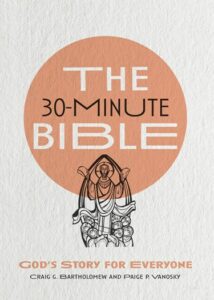 The 30-Minute Bible: God’s Story for Everyone Craig Bartholomew & Paige P. Vanoksy (IVP) $17.00 OUR SALE PRICE = $13.60
The 30-Minute Bible: God’s Story for Everyone Craig Bartholomew & Paige P. Vanoksy (IVP) $17.00 OUR SALE PRICE = $13.60
I do not have to say much about this, either — it should be commonplace that our understanding of any part of the Bible (see the above scholars and teachers) is informed by the context within the broader unfolding story and plot line of the whole Bible. Catholics may call it “salvation history” and some Reformed folks talk about “the history of redemption” but everyone knows (or should) that the Bible does have a coherent story line and is like a play with several acts. We can’t just dip in any old place and understand it well. We’ve got to know the big picture.
Craig Bartholomew himself has become somewhat famous for helping us see this very thing. For instance, see his splendid, rich overview of the Bible [co-written with Michael Goheen] called The Drama of Scripture: Finding Our Place in the Biblical Story (published by Baker Academic) and the abridged and simplified version of that called The True Story of the Whole World: Finding Your Place in the Biblical Drama now released in an updated edition by Brazos Press.) These two are among the very best Bible overviews we know, and, believe me, we have a lot of them. But these are the best.
This very new one maintains that covenantal emphasis of the coherent plot line of the big story of Scripture as it unfolds in redemptive history. But it is really brief, even if thoughtfully explained. There is a short chapter on every book of the Bible and the explanations are outstanding. Bartholomew’s co-author, Paige Vanosky, was a driving force behind this. She is a lively woman, known for her passion for this big-picture Bible teaching. The two of them are perfect co-authors and The 30-Minutes Bible is fabulous for it. Also, each chapter is nicely enhanced with a very attractive liturgical-looking black and white woodcuts which illustrates a particular theme or point in that particular book of the Bible done by the very talented artist Brother Martin Erspamer (a Benedictine monk at St. Meinrad Abby in Indiana.)
I have seen a lot of introductions to the Bible and a lot of handbooks that basically explain the point of every book of the Bible. This is the best, hands down. It is brief (although I’d call it the 30-day Bible, not the 30-minute one; it only means to suggest that every introductory lesson is about 30 minutes.) It is interesting, substantive, theologically informed and pleasantly encouraging, helping us take up a Biblically-shaped worldview and social imagination as we live out of this big, redemptive story. Highly recommended!
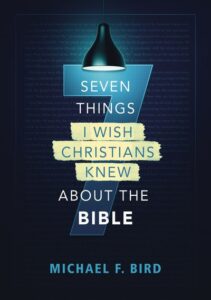 Seven Things I Wish Christians Knew About the Bible Michael F. Bird (Zondervan) $17.99 OUR SALE PRICE = $14.39
Seven Things I Wish Christians Knew About the Bible Michael F. Bird (Zondervan) $17.99 OUR SALE PRICE = $14.39
Michael F. Bird is a splendid, rising star of reliable, centrist sorts of Biblical teaching. He’s the Academic Dean in theology at Ridley College in Melbourne and has written widely, including lay-oriented stuff and very technical academic work. He co-edited the brand new The Cambridge Companion to the Apostolic Father, for crying out loud! Maybe one of his most appreciate big volumes is the massive tome (and delightful DVD curriculum) he did with N.T. Wright called The New Testament and Its World. Oh yeah, he’s that guy.
And, so, to have a heavy-duty world class scholar offer his own quick take on key things we should know about the Bible, in an inexpensive, fairly brief paperback, is a great gift and we should listen. Getting this stuff down is so important and while it pokes a bit against both the liberals and the literalists, and has a better vision than either, it really is pretty standard-fare, thoughtful, solid stuff.
Here are his chapter titles, just so you know. This stuff will preach. And if it won’t in your circles, maybe you really need to buy a few of these and pass ’em out.
1. The Bible Didn’t Fall Out of the Sky
2. The Bible Is Divinely Given and Humanly Composed
3. Scripture Is Normative, Not Negotiable
4. The Bible Is for Our Time, but Not about Our Time
5. We Should Take the Bible Seriously, but Not Always Literally
6. The Purpose of Scripture Is Knowledge, Faith, Love, and Hope
7. Christ Is the Centre of the Christian Bible
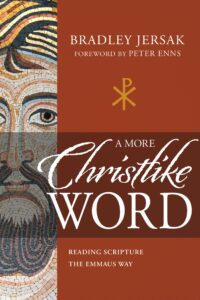 A More Christlike Word: Reading Scripture in the Emmaus Way Bradley Jersak (Whittaker House) $19.99 OUR SALE PRICE = $15.99
A More Christlike Word: Reading Scripture in the Emmaus Way Bradley Jersak (Whittaker House) $19.99 OUR SALE PRICE = $15.99
Oh my, this is both fascinating, not that complicated (in my humble view) and yet a major release that is going to be debated, I’m sure. I hope you know this important writer. Allow me to try to place him just a bit if you are not aware of his passionate books and his call to recover a more ancient way of understanding God, our faith, and the Bible.
I suppose it would be helpful (although not essential) to know that, strongly driven by Jersak’s commitment to a high Christology and Christ-centeredness, this new book is the third in a series starting with A More Christlike God which was followed by A More Christlike Way; the first was about how best to understand God — if we want to know about God, we must see God the way God really is: namely, in the Person of Jesus Christ who perfectly reveals the Father. The second book in this series was similar: if we want to know what it means to be a Christian, we need a more beautiful way of living that is truly Christ-like. And so, naturally, this new third one follows this same schema: to understand the Bible we must understand it in light of Jesus. In all three cases, this is nothing but good Christian sense and classic, old-school theology. And, yet, as Jersak shows, in all three cases, it is an insight that is nearly revolutionary these days and not at all the way ordinary religious people usually approach these things. To see God as Christ-like, not wrathful; to see our discipleship as a Way and not a mere intellectual assertion of doctrinal claims; to see the Bible as a pointer to Jesus and His redemptive story — all are deeply right truths and (yet oddly) ripe for controversy.
As you may surmise, Jersak has affinity with a Mennonite or Brethren (often called Anabaptist) view of the loving goodness of God and the obvious nonviolence of Jesus. Naturally, those who follow Christ as Lord, Anabaptists say, will not be conscripted into the world’s wars and power plays but will, overflowing with His love, turn the other cheek and do good to those who are our enemies; the Master said blessed are the peacemakers so they take that call seriously. Similarly, Jersak doesn’t see human violence and arrogance as at all Christlike but, more, he doesn’t just see humble nonviolence as “just” an ethical command, that we are to do (which is true enough) but, more deeply, as an essential theological truth rooted in the very character of God and the redemptive work of the cross. It was Ron Sider in his little 1970s book Christ and Violence who first helped me move from merely an ethic of nonviolence and peacemaking to a deeper spiritual and theological position that asserts our commitment to nonviolence as it is grounded in and reflects the very heart of God and the gospel itself. While we were yet His enemies, Romans says, Jesus died for us. It’s how God is and how the upside-down Kingdom works! Extravagantly offering unmerited grace and healing, redemptive love for enemies is at the very heart of the gospel, at the heart of God, at the heart of the work of the Holy Spirit, at the heart of the Christian faith.
Jersak, it seems to me, makes this turn, seeing the nonviolent love and mercy of God as a central, core, theological reality about the nature of God and not a simple command to us. Sure, if Jesus commands us to love enemies, we must; it is our duty to our King. But, again, the approach offered here seems more fundamental, essential: our peaceful way in the world is not just a command for those who are fastidious about their ethics, it reveals the core Divine reality, the grace of a merciful God who in the incarnation brings gospel goodness to the world He so loves.
I may be describing here more about my own formulations than describing Jersak’s own writings. And he does write a lot. He has a number of good titles, from a new novel called The Pastor: A Crisis to a very nice kid’s book called Jesus Showed Us, to an academic work called Her Gates Will Never Be Shut: Hell, Hope, and the New Jerusalem (with a forward by ICS prof Nik Ansell) to an older one on caring for the poor called Kissing Lepers. He co-edited a major academic work on the atonement with central Pennsylvania scholar/teacher Michael Hardin called Stricken by God? Nonviolent Identification and the Victory of Christ. That big volume includes pieces by internationally known authors from N.T. Wright to Sharon Baker, from James Alison to Richard Rohr.
I trust this shows you something of the calibre of this scholar’s thinking and his healthy, even pastoral, ecumenical orientation. He’s curious and interesting and a wide-ranging thinker. And yet, A More Christlike God: Reading Scripture the Emmaus Way isn’t a heady argument but a sweet invitation to a richer, more transformative encounter with the printed page of the Bible and the living Christ who, through His Spirit, draws us into His presence through the various genres of this sacred book.(The “Emmaus” allusion is not incidental but key.) It is a book that is situated somewhere between Scripture and the Authority of God: How to Read the Bible Today by Tom Wright, Brueggemann’s Prophetic Imagination and The Bible Tells Me So and How the Bible Actually Works by Pete Enns (who has an instructive introduction offering his five points for Biblical interpretation.) Jersak is working out of that mere Christian vision that C.S. Lewis articulated when he talked about the gospel being a “true myth” and he draws on a lot of reputable sources to do just that. He even has a lovely and intriguing afterward listing books that offered “a spring to my step on the Emmaus way.” Don’t you just love that?
For those who care about these things, he has a few good case studies where he’ll show, for instance, how the KJV and the NIV translate a given text (oh, say, Isaiah 53:10) and how the Septuagint does not have God being pleased by bruising or crushing His suffering servant. The Greek word the early interpreters of the Hebrew use is katharisai “which the New Testament uses many times for Jesus’s ministry of healing connotations, as when Jesus cleansed the leper in Matthew 8:3.) Jersak makes us aware (and whether you finally agree with his conclusions or not, this is valuable) that even the translations are biased by certain theological assumptions — like that God is violent. This book will rock your world and yet it is wise and always invites us to hear Jesus, the living Word.
Well. This is an energetic and funny and at times shocking book. We are happy to recommend it. His endorsements are wide-ranging, from Fr. John Behr (who is Orthodox) to Fr. Kenneth Tanner (who is Anglican) to Calvin scholar and author Julie Canlis. Philosopher Baxter Kruger says it is “an extraordinarily fresh yet remarkably ancient” and Canadian singer-songwriter Steve Bell says it “mercifully wrestles the scriptures from the gray, gripping fingers of modernity’s literalists and placed them back in the supple hands of Jesus.” Jersak’s pal Brian Zahnd says of the many recent books on biblical interpretation, A More Christlike Word is “the most thorough and comprehensive. It is a gift!”
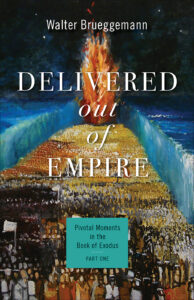 Delivered Out of Empire: Pivotal Moments in the Book of Exodus (Part One) Walter Brueggemann (WJK) $15.00 OUR SALE PRICE = $12.00
Delivered Out of Empire: Pivotal Moments in the Book of Exodus (Part One) Walter Brueggemann (WJK) $15.00 OUR SALE PRICE = $12.00
We have been delighted to see so much stuff coming out from Walt in these recent years. Many of the books, though have been topical (a recent small introduction to the prophets, the popular one on Sabbath, one on speaking out, the one about materiality, the ones on Advent and Lent and, of course, the stunning little Virus as a Summons to Faith: Biblical Reflections in a Time of Loss, Grief, and Uncertainty.) Or they have been collections of previously published pieces, such as an anthology I love, the huge Truth and Hope: Essays for a Perilous Age.) He hasn’t done a full commentary in a while and while this new one isn’t a detailed commentary as such, it does walk us through the key moments of the Book of Exodus. Indeed, that is its structure — each chapter highlights a key text where the action pivots, specific verses and incidents we might miss but when we see what’s happening, it opens up the plot. Delivered… is succinct, readable, inexpensive, and in a way indispensable for those studying this remarkable book of the Older Testament. If you’ve heard Walt, ever, you know these are themes that are close to his heart and that he knows the texts verbatim. He is a master of the material and yet a poet, rigorous about the literary nature of the story and also the theology implicit (or explicit, as the case may be.) He’s a close reader and a wild preacher. He’s got a writing style that is idiosyncratic and unmatched.
Delivered Out of Empire offers ten chapters on ten key moments in the story from Exodus 1 to 15. (Part Two will be called Delivered Into Covenant: Pivotal Moments in the Book of Exodus will come out in November 2021 and will pick up the story once Israel passes through the Red Sea.) Drawing out “pivotal moments” in the text helps us, as the publishers put it, “untangle” the story and, of course, with Brueggemann’s bold voice, shows us how we make sense of what the Exodus might have to say about our own “systems of domination and economic excess.” There are a couple of well articulated (even if not simplistic) questions to ponder and discuss after each chapter. What a book.
By the way, this volume is the first in a series called “Pivotal Moments in the Old Testament” edited by Brueggemann’s old friend Dr. Brent Strawn. As the publishers explain, this series is intended to “help readers see Scripture with new eyes, highlighting short, key texts -“pivotal moments” — that shift our expectations and invite us to turn toward another reality transformed by God’s purposes and action.”
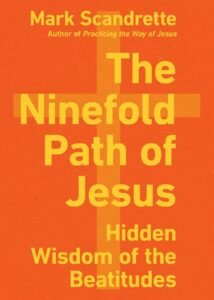 The Ninefold Path of Jesus: Hidden Wisdom of the Beatitudes Mark Scandrette (VP) $16.00 OUR SALE PRICE = $12.80
The Ninefold Path of Jesus: Hidden Wisdom of the Beatitudes Mark Scandrette (VP) $16.00 OUR SALE PRICE = $12.80
I love the energetic, missional, edgy sort of writing that Scandrette brings. I honest wish we sold more of his books and I am delighted to remind you of him now. This new compact paperback is about “charting a path back to reality.” Yes!
In a way, this practical (if visionary) call to ponder the actual way of life that is shaped by this portion of the Sermon on the Mount is nothing new for Mark as he as long invited us into a distinctive practice, a Christian way, a faithful presence in the community that is shaped by the triune God and the teachings of Christ. I loved his excellent Practicing the Way of Jesus: Life Together in the Kingdom of Love and his very important book Free: Spending Your Time and Money on What Matters Most. He and his wife wrote one of the best contemporary missional books on family life from a Kingdom perspective (Belonging and Becoming: Creating a Thriving Family Culture.) His books have all been honest, refusing, and creative. Creative? Yep! He now is the director of ReImagine: A Center for Integral Christian Practice (which is a little less flamboyant than his previous work in the ”Jesus Dojo.”) As Shane Claiborne puts it, he is an “instigator of holy mischief.” He lives in San Francisco and teaches in the Doctoral program at Fuller.
The Ninefold Path of Jesus just released and we are pleased to recommend Scandrette’s reflection on Jesus’s nine sayings “that move us beyond our first instinct and instead embrace the deeper reality of the Kingdom of God.” Let’s face it — this is radical and important stuff for any of us who may be tempted by “the illusions and false beliefs that keep us chained and imprisoned.” And this book is going to offer solid Bible study and reflections but push towards application and transformation. You are going to want to process this, believe me!
I want to say two important things about this little book. Firstly, Scandrette tells us that it came out of conversations with two friends in the UK. They were together there after a recent bombing in Europe and one of the friends they noted how many young people are being recruited to terrorist organizations; young post-Christian kids were being “radicalized” to this awful movement. Danielle noted how the church seems to be failing in offering young idealists much of a vision or compelling story — church participating continues to plummet. Mark replied to her that in the US church folks were mostly cool (if even) about the vivid way BLM activities were drawing people into the struggle for justice after the murder of George Floyd. What can we do to reach disaffected folks and invite them to a better story, a better way? Out of these intense questions they started an audio arts project called the Nine Beats Collective.These postures in the book came out of that very conversation and projects so it is sort of a tract for our times, an invitation to the way of Jesus most designed for seekers or anyone who struggles with faith (or the questions of the way the church supports the status quo.) There is a great video and other good stuff at the Ninefold Path webpages.
Secondly, there are hip drawings inside show the postures “from” and the postures to which Scriptures (in the Beatitudes, at least) call us. That is, there is a pen and ink cartoonish illustration of a person moving from one posture to another. This is very moving, oddly so. Kudos to Leah Sands for that. It makes it a powerful little book and certainly not just a dry exegesis of Biblical text. I think the academics (above) would approve.
Here is the table of contents:
Introduction: Nine Postures for Life
1. The Way of Trust: Own Your Poverty, Live with Open Hands
2. The Way of Lament: FaceYour Pain, Wait for Comfort
3. The Way of Humility: See Your True Self, Bow to the Dignity of All
4. The Way of Justice: Ache for Change, Step into Action
5. The Way of Compassion: Stop Judging, Look with Love
6. The Way of the Right Motive: Choose Goodness, Show the Real You
7. The Way of Peacemaking: Make Peace, Reach Past Differences
8. The Way of Surrender: Embrace Suffering, Keep Doing Good
9. The Way of Radical Love: Have Hope, Live Fearlessly
Conclusion: Living the Ninefold Path
Appendix 1: Ninefold Path Prayer and Examen Questions
Appendix 2: Summary of the Ninefold Path
Appendix 3: The Beatitudes and Personality
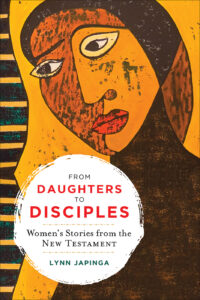 From Daughters to Disciples: Woman’s Stories from the New Testament Lynn Japinga (WJK) $18.00 OUR SALE PRICE = $14.40
From Daughters to Disciples: Woman’s Stories from the New Testament Lynn Japinga (WJK) $18.00 OUR SALE PRICE = $14.40
From Widows to Warriors: Women’s Stories from the Old Testament Lynn Japinga (WJK) $18.00 OUR SALE PRICE = $14.40
There is nearly a cottage industry of books about women in the Bible. For good reason — many are remarkable stories, some inspiring, some gut-wrenchingly awful. What the heck is going on with some of those? Of course, most churches tend not to dwell much on such things. Some churches seem to promote the subjection of women, as if that is what the stories and women of the Bible teach us. (And so, when some evangelically minded women show otherwise, as in the four books I reviewed at BookNotes a few weeks ago HERE the push back is firm and sometimes ugly.) In this context books come out that look at women of the Bible and some are pretty sweet — okay, but a bit too inspirational. Some are ideological, driven by an agenda to side with the oppressed, perhaps stridently so. Some are sentimental and sugary, others are academic and dense. We are always on the lookout for books that are fresh and interesting, honest before the Scriptures, and pushing readers to see God’s liberating power in and for women.
Some stories in the Older and Newer Testaments are familiar but some are not. The most useful books, I think, cover some of the old chestnuts, standard stories, and perhaps invite us to notice and pay attention to (perhaps for the first time) lesser known episodes. Mabe the women are not even named. There is much work to be done, but it has to be done well.
I think Lynn Japinga, a preacher ordained in the Reformed Church of America (RCA) and professor at Hope College (in Holland, Michigan), gets all this very right. She has thought hard about all this, having written a book called Preaching the Women of the Old Testament: Who They Were and Why They Matter. Although written for pastors about how to incorporate these female characters into their sermons, there is much for any of us in that major work. She also is a contributor to the useful worship planning resource that follows the Revised Common Lectionary called Connections: A Lectionary Commentary for Preaching and Worship (also published by WJK.)
 Out of that work and care for congregational life, it seems, two other books came. These are designed for ordinary readers and are ideal for adult Sunday school classes, Bible studies, book clubs, or small groups. From Daughters to Disciples: Woman’s Stories from the New Testament is new but in 2020 we saw the release by Japinga of From Widows to Warriors: Women’s Stories from the Old Testament. Both volumes include stories known and beloved and some harder texts to ponder. (The Old Testament one is, understandably, a bit longer, btw.) They both allow us to (as Beth Tanner of New Brunswick Theological Seminary put it) “feel a connection with our ancient sisters; their acts of bravery and dedication remind us that our Christian call is to do the same.”
Out of that work and care for congregational life, it seems, two other books came. These are designed for ordinary readers and are ideal for adult Sunday school classes, Bible studies, book clubs, or small groups. From Daughters to Disciples: Woman’s Stories from the New Testament is new but in 2020 we saw the release by Japinga of From Widows to Warriors: Women’s Stories from the Old Testament. Both volumes include stories known and beloved and some harder texts to ponder. (The Old Testament one is, understandably, a bit longer, btw.) They both allow us to (as Beth Tanner of New Brunswick Theological Seminary put it) “feel a connection with our ancient sisters; their acts of bravery and dedication remind us that our Christian call is to do the same.”
I love that the new NT book reminds us that there are faithful forerunners of the gospel story like Anna and Elizabeth and there are female disciples of Jesus (like Mary, Martha, and Mary Magdalene) and there are first-generation followers in the early church like Lydia and Dorcas. As the publisher puts it “readers will encounter a wealth of fore-mothers in all their messy, yet redeemable, humanity.” And, as Rev. Japinga says, these stories as the Word of the Lord are not moral lessons about good or bad behavior, to be emulated or avoided. They are about God’s work in the redemption story; they are revelatory of good news, even within horrific situations, if we have the eyes to see. She is an experienced preacher and teacher so has a great capacity to help us see.
Two quick comments — a local women’s group from a fairly ordinary country church (of a mainline denominational sort, but culturally fairly conservative) have bought both of these from us and they loved them. The discussion questions that included after each study are good and the actual session guides in the back (which includes some brief opening and closing litanies and prayers.) Both From Widows to Warriors and From Daughters to Disciples have worked well, thoughtful inviting members into a deeper conversation around these texts. We would love to hear if your small group or Bible class finds them useful.
A second small observation. I’m not sure why the designers of the book used the contemporary art pieces they did for the covers. My hunch is that many will really love them (we do) and we know others do not. They are a bit abstract and edgy and sophisticated, like ‘em or not. I can’t say for sure, but it strikes me that maybe they wanted to show that this is not a typically upbeat evangelical Bible study like one might find at LifeWay or some lovely women’s ministry retreat for the ladies. These are gritty and tough (and tender and sensuous) like the real women and their stories studied in the real Bible. I am not saying the are necessarily obscure or intentionally hard-hitting, but that these may be a bit demanding for some who are not familiar with this sort of honest, Biblical, feminist scholarship. The art pieces are, by the way, “Zoe de la Mer” by Marie Hugo and “Black Madonna” by Laura James.
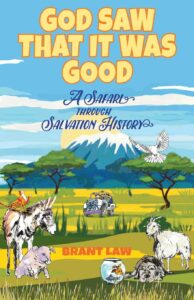 God Saw That It Was Good: A Safari Through Salvation History Brant Law (Paraclete Press) $16.99 OUR SALE PRICE = $13.59
God Saw That It Was Good: A Safari Through Salvation History Brant Law (Paraclete Press) $16.99 OUR SALE PRICE = $13.59
Okay, I have to smile a bit by including this nice little book here with heavyweights like Rutledge, Gorman, Wright and Brueggemann and the others. Brant Law is a high school math teacher and serious animal lover. I suspect he does some Scripture teaching in his Catholic parish (he lives in Alma, Arkansas, with his wife and cats Ana, Bella, and Pom Pom.) He comes across in the very first pages as a heckuva guy, funny in an awe-shucks sort of way, down to Earth and earnest as all get out.
But get this: he not only loves animals, He loves God’s Word and he shows how animals show up all over the Biblical story. In God Saw That It Was Good Law offers stories and theology, Biblical exploration and spiritual truths. And, to be honest, there is a lot about the legends of saints, many who have pretty remarkable animal stories. (Move over, St. Francis, you aren’t the only one who seems to have been a spiritual Dr. Doolittle.)
One vet (that is, a veterinarian) says that this fun book offers “biblical and practical wisdom reflecting on animals both symbolically and literally.” That is true. Fr. Jeremiah Myriam Shryock, the author of a book on deeper, contemplative prayer (Amid Passing Things) says that this is “a book about the mystery and wonder of God. It will open the eyes of the readers to God’s presence in new and exciting ways.”
I don’t know if it is new to realize God works in the Bible through animals, but it is stimulating to see chapters on donkeys and snakes and cows and horses and a serious one on the goat. Some of this is directly Biblical and others are anecdotes or stories from the saints. He looks at pigs and lambs and has a chapter called “Birds of Pray” and another called “The Fish Fries of Men”, not to mention one called “A Sordid Hisstory.” You’ll have to read it for yourself to see what “My Best Friend” is about. The last chapter is called “Bugging Out.” I bet there is somebody out there who has waited for years for a chapter on bugs in the Bible. Am I right?
Here is how the other nicely puts it:
I hope this book brings you a glimpse of God on the backs, whiskers, scales, and wings of our furry and sometimes not so furry friends. This collection of stories about animals in the Bible, the lives of the saints, and from my own life, is presented no only so that you might learn about these amazing animals, but to appreciate how God uses creation to draw us closer to him and guide us to the life he wants us to live.
+++
ORDER ANY OR ALL OF THESE USING THE LINK TO THE ORDER PAGE BELOW.
It is very helpful if you would tell us how you prefer us to ship your orders. The weight and destination of your package varies but you can use this as a thumbnail, general guide.
There are generally two kinds of US Mail options, and, of course, UPS. If necessary, we can do overnight and other expedited methods, too.
- USPS has the option called “Media Mail” which is cheapest but slow and may be delayed. For one book, usually, it’s about $3.70.
- USPS has another option called “Priority Mail” which is about $7.00 or so for one or two books and that gets much more attention than does “Media Mail.”
- UPS Ground is more reliable but about $8.00 or more for one book or two to most places.
PLEASE LET KNOW KNOW WHAT SHIPPING METHOD YOU PREFER. IF YOU PREFER U.S. MAIL
PLEASE INDICATE WHICH METHOD OF U.S. MAIL.
BookNotes

SPECIAL
DISCOUNT
20% OFF
ALL BOOKS MENTIONED
+++
order here
this takes you to the secure Hearts & Minds order form page
just tell us what you want to order
inquire here
if you have questions or need more information
just ask us what you want to know
Hearts & Minds 234 East Main Street Dallastown PA 17313
read@heartsandmindsbooks.com
717-246-3333
We are still closed for in-store browsing due to our commitment to public health and the common good (not to mention the safety of our staff and customers.) The vaccination rates in our county are lower than average here in our fine state. This griefs us.
We are doing fun, outdoor, backyard service, our famous curb-side delivery, and can show any number of items to you if you call us from our back parking lot. We are eager to serve and grateful for your patience as we all work to mitigate the ongoing pandemic. Do visit if you are in the area.
Of course, we’re happy to ship books anywhere. Just tell us how you want them sent.
We are here 10:00 – 6:00 Monday – Saturday; closed on Sunday. Thanks for your support.
